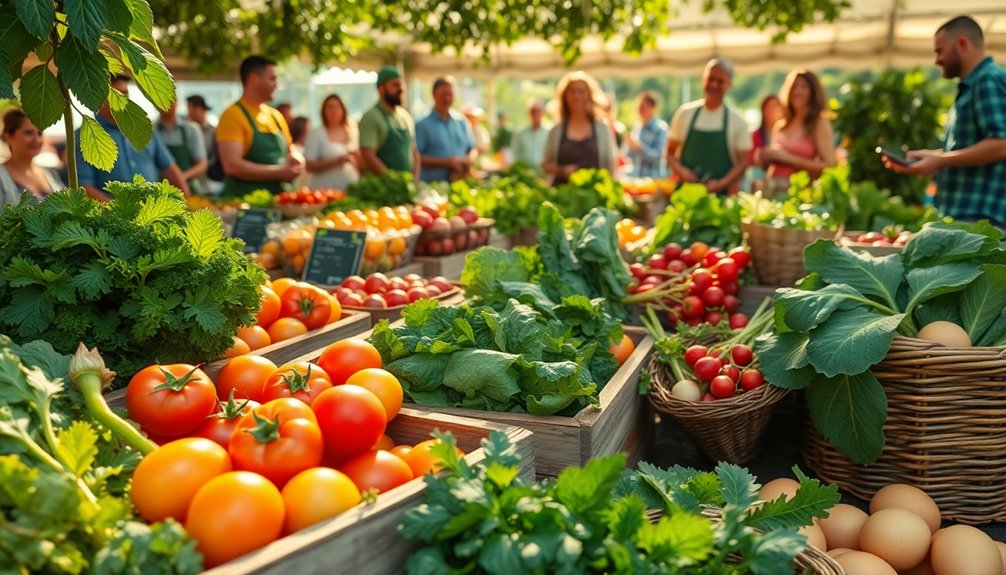A sustainable diet lets you enjoy health benefits while protecting the environment. By choosing locally sourced, organic, and seasonal foods, you reduce your carbon footprint and support local farmers. Prioritizing plant-based meals, rich in nutrients and fiber, can decrease your risk of chronic diseases and lower greenhouse gas emissions. Additionally, minimizing food waste through smart planning not only saves money but helps conserve valuable resources. By adopting eco-friendly cooking practices, you further contribute to sustainability. Explore the many dimensions of sustainable eating to reveal more insights and tips for creating a healthier, eco-conscious lifestyle.
Key Takeaways
- Choose locally sourced, organic, and seasonal foods to support health and the environment while reducing transportation and chemical impacts.
- Prioritize a plant-based diet, which is lower in carbon footprint and beneficial for metabolic health and animal welfare.
- Focus on whole, minimally processed foods to gain essential nutrients and reduce the risk of chronic diseases.
- Minimize food waste through meal planning, smart shopping, and composting to save money and conserve resources.
- Engage with local farmers by visiting markets or subscribing to community-supported agriculture for fresh produce and community support.
Understanding Sustainable Diets
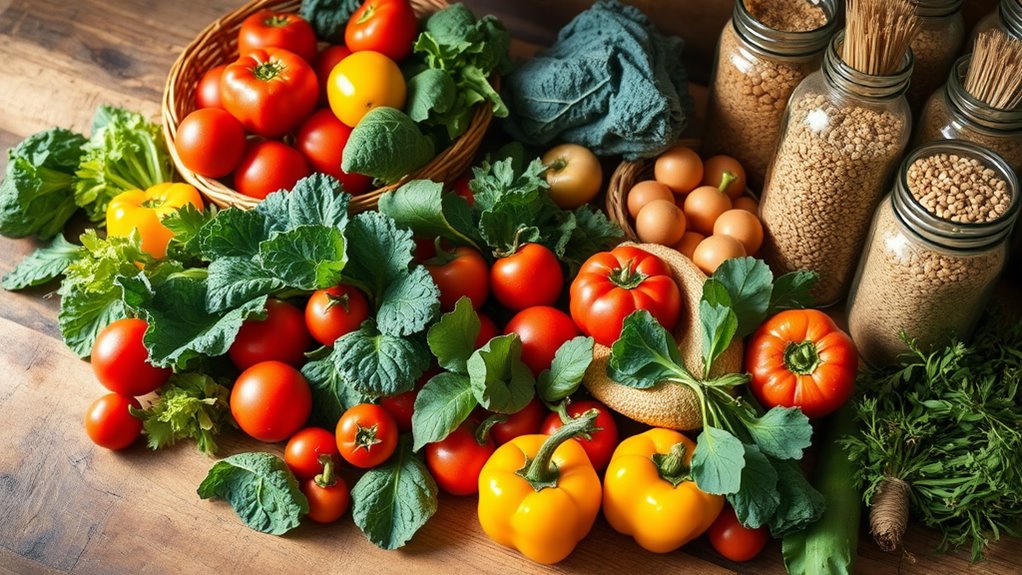
Understanding sustainable diets involves recognizing how our food choices impact not just our health but also the environment. Every meal you create or consume contributes to a larger ecological footprint. By choosing locally sourced, organic, and seasonal foods, you can help reduce the environmental impact of transportation, chemical use, and unsustainable farming practices.
It's essential to be mindful of what's on your plate. For instance, plant-based diets tend to have a lower environmental impact compared to those heavily reliant on animal products. Livestock farming is resource-intensive, requiring significant land, water, and energy. By incorporating more fruits, vegetables, grains, and legumes into your meals, you not only nourish your body but also contribute to a more sustainable food system. In fact, adopting a plant-based diet can lead to improved health and vitality while also supporting a more sustainable food system.
You might also consider the significance of food waste. It's staggering to think that about one-third of all food produced globally is wasted. By planning your meals and using leftovers creatively, you can minimize waste and its associated environmental consequences.
Benefits of Sustainable Eating
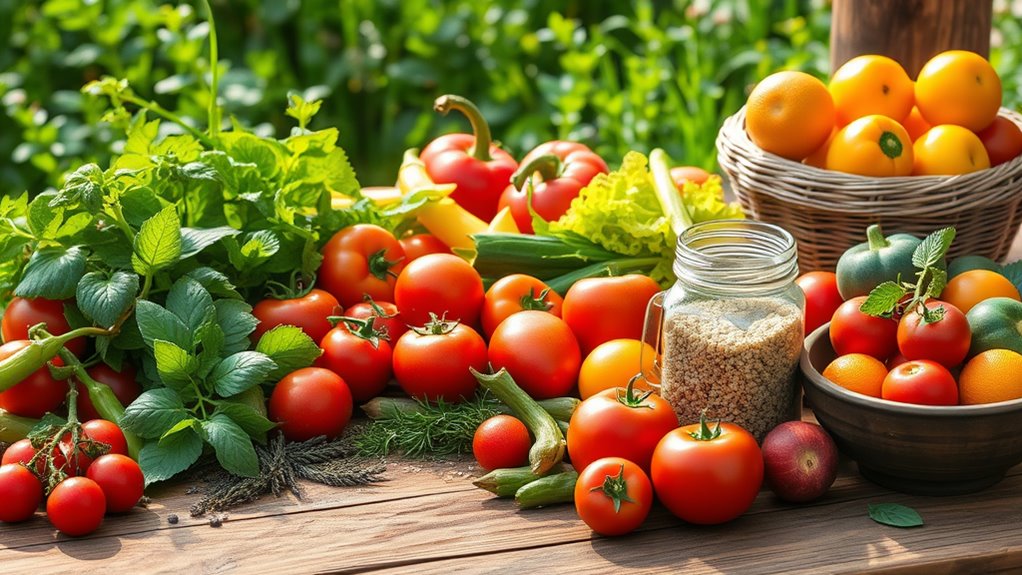
Numerous benefits come with adopting a sustainable eating lifestyle, impacting your health and the planet. By focusing on whole, minimally processed foods, you're more likely to consume essential nutrients that promote better health. Research shows that such diets can reduce the risk of chronic diseases like heart disease, diabetes, and certain cancers. Plus, when you prioritize fruits, vegetables, and whole grains, you're also fueling your body with energy-rich, fiber-filled foods that keep you feeling full and satisfied.
But it's not just about personal health; your choices also have a significant environmental impact. Sustainable eating encourages the use of local, seasonal produce, which reduces the carbon footprint associated with transporting food long distances. By consuming fewer animal products and more plant-based foods, you're contributing to decreased greenhouse gas emissions, water usage, and land degradation. This means you're playing a part in protecting our planet for future generations. Additionally, participating in a 1 Month Vegan Challenge can help you transition to a more sustainable diet while experiencing numerous health benefits.
Furthermore, many communities are coming together to support local farmers and engage in sustainable practices. By choosing to eat sustainably, you're not only improving your health but also fostering a sense of belonging within your community. You're joining a movement that values mindful consumption, which can lead to stronger connections with those around you.
In essence, embracing a sustainable diet is a win-win situation. You're enhancing your well-being while simultaneously caring for the Earth, making choices that resonate with your values and aspirations for a healthier lifestyle.
Plant-Based vs. Animal-Based Foods

When contrasting plant-based and animal-based foods, it's important to acknowledge how each option impacts your health and the environment. Plant-based diets are increasingly popular, and for good reason. They provide numerous health benefits while also minimizing your environmental impact. Here are four key points to take into account:
- Nutrient Density: Plant-based foods are often rich in vitamins, minerals, and fiber, which are essential for overall health. They can help reduce the risk of chronic diseases like heart disease and diabetes.
- Lower Carbon Footprint: Producing plant-based foods generally requires less land, water, and energy compared to animal-based foods. This means that by choosing more plants, you're contributing to a healthier planet.
- Sustainable Farming: Many plant-based foods can be cultivated using sustainable practices that preserve ecosystems and biodiversity. This contrasts with some animal farming practices that can lead to habitat destruction.
- Animal Welfare: A plant-based diet often aligns with ethical considerations regarding animal welfare. By reducing or eliminating animal products, you support a system that values humane treatment of animals.
Moreover, research from Emory University School of Medicine indicates that adopting a plant-based diet can significantly improve metabolic health and potentially reverse conditions like type 2 diabetes.
Ultimately, the choice between plant-based and animal-based foods can influence not only your health benefits but also the broader environmental impact. By leaning towards more plant-based options, you're making a decision that reflects a commitment to both personal well-being and the health of our planet. Embracing this shift can foster a sense of belonging in a community that values sustainability and compassion.
Seasonal and Local Foods
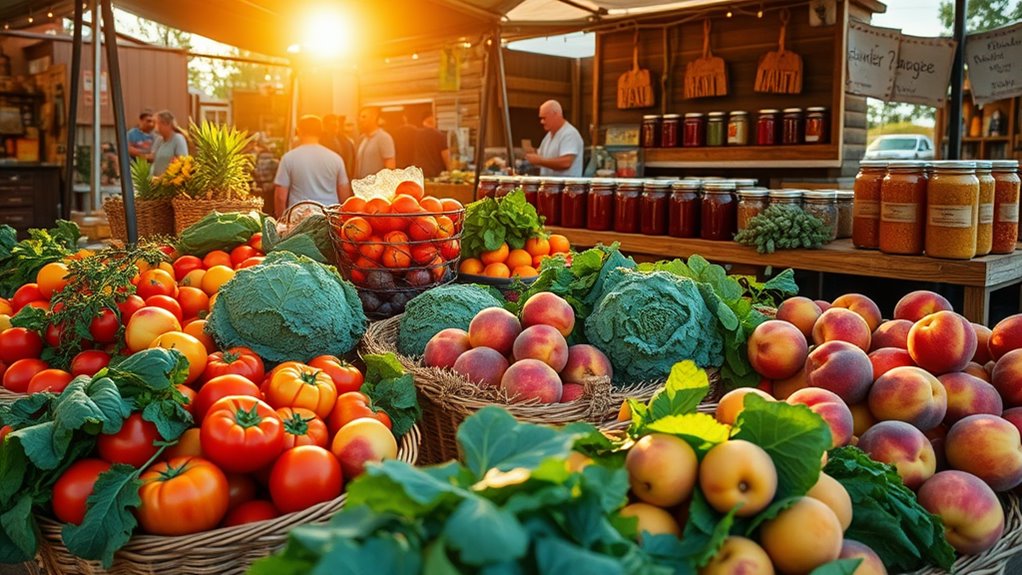
Embracing seasonal and local foods can greatly enhance both your diet and the environment. When you choose to eat foods that are in season and sourced from nearby farms, you're not only supporting your health but also your community. Seasonal foods are often richer in nutrients since they're harvested at their peak ripeness.
Plus, local produce doesn't have to travel long distances, which means it retains its freshness and flavor.
Visiting farmers markets is a fantastic way to connect with local growers and discover what's in season. You'll find a vibrant array of fruits, vegetables, and even artisanal products, all while fostering a sense of community. By engaging with farmers, you can learn about their growing practices and the unique benefits of their products.
Another great option is to get involved in community supported agriculture (CSA). By subscribing to a CSA, you receive a regular share of fresh, seasonal produce directly from a local farm. This not only supports sustainable farming practices but also encourages you to try new foods and recipes you mightn't have considered before.
Ultimately, choosing seasonal and local foods cultivates a deeper connection to your meals and the environment. You're actively participating in a food system that values freshness, sustainability, and community. Additionally, embracing healthy eating habits can enhance your overall well-being and promote rapid fat loss. So, next time you're planning your meals, consider what's in season and nearby. It's a simple way to nourish yourself and contribute to a healthier planet.
Reducing Food Waste

Reducing food waste is essential for creating a sustainable diet and minimizing your environmental impact. When you cut down on waste, you not only save money but also help conserve resources and reduce greenhouse gas emissions. Here are some practical steps you can take to make a difference:
- Meal planning: Before you head to the grocery store, plan your meals for the week. This helps you buy only what you need, reducing impulse purchases and the likelihood of spoilage.
- Smart shopping: Stick to your shopping list and avoid buying in bulk unless you're sure you'll use it. Check expiration dates and choose items that are fresher.
- Composting leftovers: Instead of tossing food scraps in the trash, consider composting them. This enriches your soil and creates a valuable resource for your garden, turning waste into nourishment.
- Creative cooking: Use what you have! Get imaginative with leftovers by incorporating them into new dishes. This not only minimizes waste but can also lead to delicious culinary discoveries. Additionally, homemade vegan smoothies can be a great way to utilize leftover fruits and vegetables, turning them into nutritious meals that support a more sustainable lifestyle.
Eco-Friendly Cooking Practices

Cooking sustainably isn't just about what you eat; it's also about how you prepare your meals. By adopting eco-friendly cooking practices, you can notably reduce your carbon footprint and contribute to a healthier planet. One effective way to start is by using energy-efficient appliances. These devices consume less power, which not only lowers your utility bills but also minimizes greenhouse gas emissions. Look for those with the ENERGY STAR label; they're designed to deliver high performance while conserving energy.
Another essential practice is zero waste cooking. This means making the most out of every ingredient you use. For instance, vegetable scraps can be transformed into flavorful broths, while stale bread can be turned into croutons or bread pudding. Embracing this mindset encourages creativity in the kitchen and deepens your connection to food, ensuring that nothing goes to waste.
You might also consider planning your meals ahead of time. By doing this, you'll buy only what you need, reducing excess food that often ends up in the trash. Additionally, using local and seasonal ingredients not only supports your community but also reduces the energy spent on transporting food. Incorporating practices that address the root cause of knee pain can also lead to a more sustainable lifestyle by promoting physical activity and well-being.
Incorporating these practices into your cooking routine fosters a sense of belonging within a community of like-minded individuals who care for the environment. By choosing energy-efficient appliances and engaging in zero waste cooking, you're not only nourishing yourself but also nurturing the planet.
Sustainable Food Labels
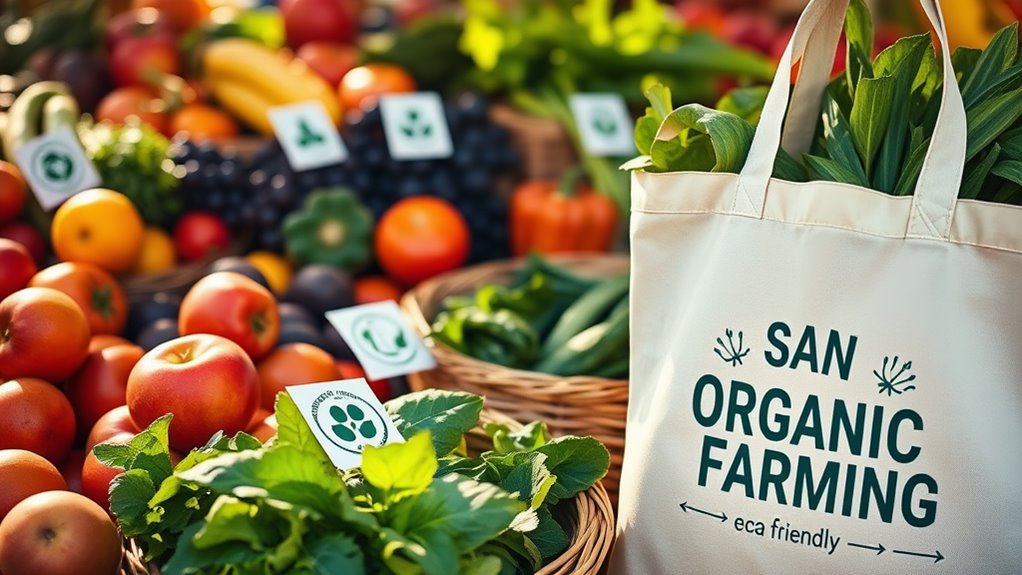
When you're making conscious choices about your meals, understanding sustainable food labels can greatly enhance your efforts. These labels not only guide you towards healthier options but also promote ethical practices that align with your values. To help you navigate this landscape, consider these four key aspects of sustainable food labels:
- Label Transparency: Look for brands that provide clear information about sourcing, production, and environmental impact. Transparency builds trust and helps you make informed decisions.
- Certification Symbols: Familiarize yourself with reputable certifications like USDA Organic, Fair Trade, and Rainforest Alliance. These symbols indicate adherence to specific sustainability standards and practices.
- Ingredient Sourcing: Pay attention to where ingredients are sourced. Local and seasonal ingredients often have a smaller carbon footprint and support local economies, reinforcing community ties.
- Consumer Education: Engage with educational resources that explain what these labels mean. Knowledge empowers you to advocate for sustainable practices and encourages brands to maintain high standards. Additionally, understanding the health risks of traditional bread consumption can help you choose more sustainable bread alternatives that align with your dietary goals.
Supporting Ethical Agriculture
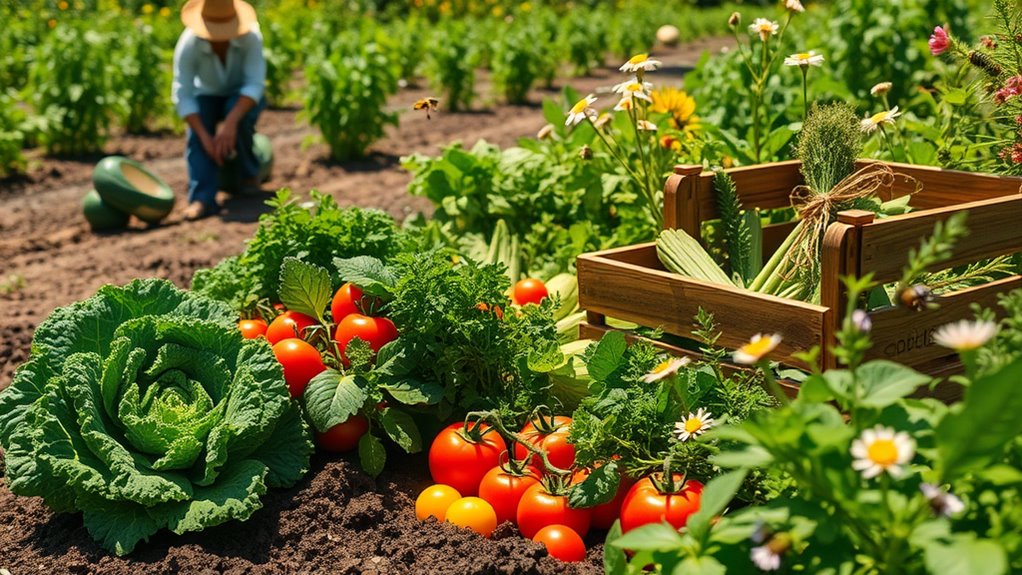
Supporting ethical agriculture involves making intentional choices that prioritize the welfare of farmers, animals, and the environment. When you choose to support ethical sourcing, you're not just making a personal decision; you're joining a community that values sustainability and compassion. By selecting food products that are grown and raised responsibly, you foster a system that respects both the earth and its inhabitants.
Embracing a farm to table philosophy means you're connecting with local farmers, understanding their practices, and appreciating the journey your food takes from the field to your plate. This connection enhances your relationship with food, allowing you to savor the flavors while knowing the ethical implications behind each bite. It encourages transparency and accountability in food production, ensuring that farmers receive fair compensation for their hard work.
Moreover, supporting ethical agriculture contributes to biodiversity and soil health. When you choose sustainably sourced products, you help reduce the dependency on harmful chemicals and promote regenerative practices that restore ecosystems. You're actively participating in a movement that nurtures not just your health, but also the health of the planet. Additionally, learning about the art of hand sharpening can improve your cooking skills and enhance your appreciation for ethically sourced ingredients.
As you make these choices, you're inviting others to join you on this journey. Sharing your knowledge and experiences fosters a sense of belonging within your community, empowering everyone to contribute to a more ethical food system. Together, you can create lasting change that benefits all—farmers, animals, and the environment alike.
Tips for Transitioning to Sustainability
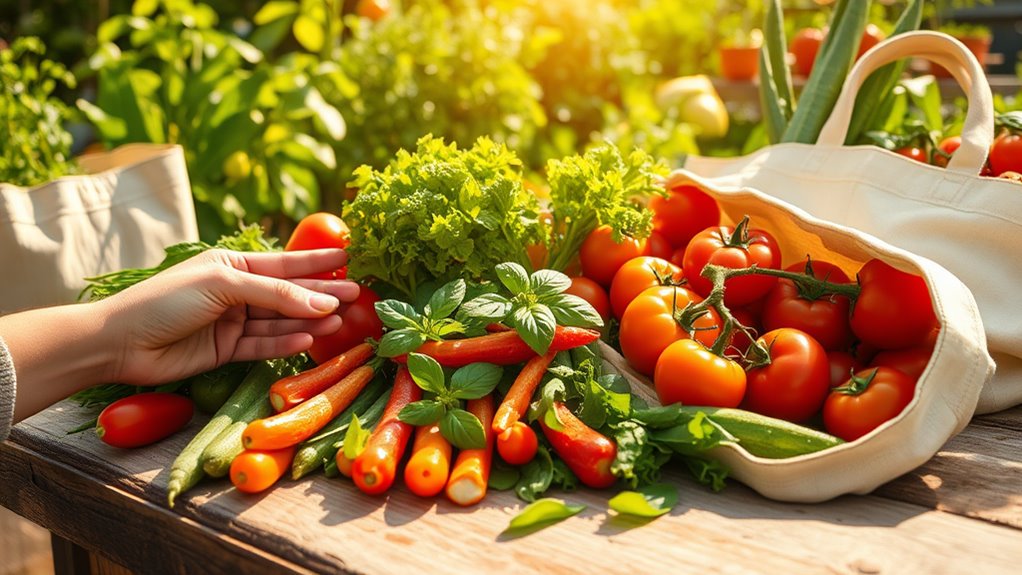
Shifting to a sustainable diet can feel overwhelming at first, but taking small, deliberate steps can lead to significant changes over time. You don't have to overhaul your entire lifestyle overnight. By focusing on practical strategies, you can create a more sustainable way of eating that aligns with your values.
Here are four simple tips to help you shift to sustainability:
- Start with meal planning: Take some time each week to plan your meals. This not only helps you make conscious choices but also reduces food waste. Choose seasonal and local ingredients when you can.
- Revamp your grocery shopping: Create a shopping list based on your meal plan. Stick to it to avoid impulse buys. Look for bulk bins, farmers' markets, and stores that emphasize eco-friendly practices.
- Embrace plant-based foods: Gradually incorporate more plant-based meals into your diet. You don't have to go fully vegetarian or vegan; even a few meatless days each week can make a difference.
- Educate yourself and connect with others: Join local groups or online communities focused on sustainable eating. Sharing your journey with others can provide support and inspiration. Additionally, understanding your body's natural calorie cycles can help you make healthier food choices and maintain a sustainable diet over time.
Frequently Asked Questions
How Does Sustainable Eating Impact Global Food Security?
Sustainable eating notably influences global food security by addressing the environmental impact of food production. When you adjust your consumer behavior towards more sustainable choices, you help reduce resource depletion and pollution. This collective shift can lead to healthier ecosystems, ensuring that food systems remain resilient.
Can Sustainable Diets Be Affordable for Low-Income Families?
Imagine a world where everyone can enjoy a feast like a family reunion, regardless of their income. You know food access often falls short for low-income families due to income disparity. However, sustainable diets can be affordable with community gardens, local markets, and bulk buying.
What Role Do Governments Play in Promoting Sustainable Diets?
Governments play a pivotal role in promoting sustainable diets through policy implementation and government support. By creating incentives for local farming and providing subsidies for nutritious foods, they can make healthier options more accessible. Additionally, they can implement educational programs that inform communities about sustainable practices.
When you engage with these initiatives, you're not just supporting your health; you're also contributing to a collective effort to foster a healthier, more sustainable future for everyone.
Are There Cultural Considerations in Adopting Sustainable Eating Practices?
Imagine sitting around a family table, filled with dishes that reflect your cultural traditions. When you think about adopting sustainable eating practices, consider how your dietary preferences play a crucial role.
Research shows that integrating local ingredients not only honors traditions but also enhances community ties. By valuing these cultural aspects, you'll find sustainable eating becomes a shared journey, enriching your connections while supporting the planet.
Embrace the beauty of your heritage while making mindful choices.
How Can Businesses Contribute to Sustainable Food Systems?
You can see businesses play an important role in creating sustainable food systems. By embracing corporate responsibility, they initiate sustainability initiatives that prioritize eco-friendly practices. Focusing on their supply chain, companies can streamline processes to reduce waste, ensuring minimal environmental impact. Engaging with local farmers and promoting ethical sourcing fosters community connections, while transparency in operations builds trust. Together, these efforts create a holistic approach that benefits everyone involved, from producers to consumers.
Conclusion
Embracing a sustainable diet isn't just about the food on your plate; it's a progression toward nurturing the planet. By choosing seasonal, local, and plant-based options, you're weaving a tapestry of health for yourself and the Earth. Reducing waste and supporting ethical agriculture are steps that transform your meals into mindful feasts. As you evolve, remember that every small change creates ripples of positive impact, guiding us all toward a greener future where balance and harmony thrive.

